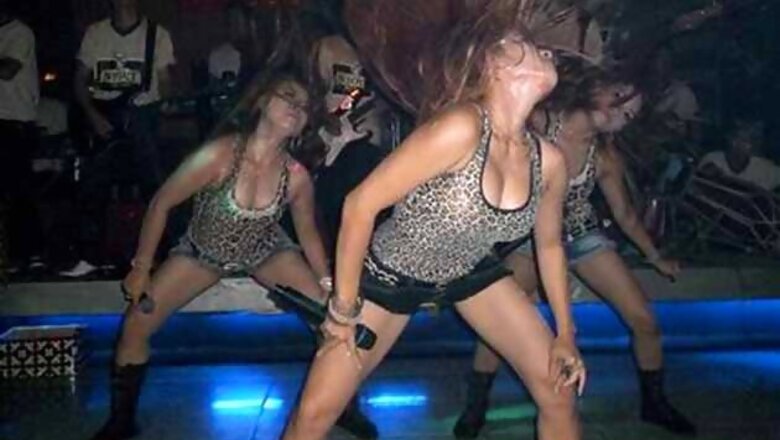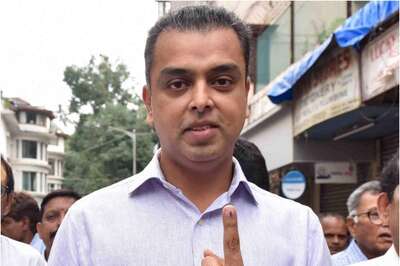
views
Jakarta: Titin Karisma parades onto the stage wearing a rhinestone bustier and matching bottoms, with sequin fringe that jiggles wildly to the rhythm of the beating drums. Preteen boys watch the singer wide-eyed as she straddles a speaker, whipping her long hair wildly. She licks the microphone and drops to the ground, repeatedly thrusting her pelvis toward a camera.
Lady Gaga's onstage antics are almost tame compared to this act, known as dangdut, the most popular genre of music in this predominantly Muslim nation of 240 million.
But while the pop star's show was effectively banned from Indonesia, tens of thousands of young women here put on performances like Karisma's every night. They shake and grind in smoky bars, ritzy nightclubs, at weddings, even circumcisions. In most cases the hosts say the sexier the better.
The apparent double standard highlights divisions between Indonesia's largely tolerant majority and a vocal minority of Islamic hard-liners. The conservatives hold outsized influence in government, and have successfully picked high-profile battles like the Lady Gaga show, but they haven't been able to stop dangdut, which has a long tradition here.
Karisma's stage shows have gotten nearly a million hits on YouTube. Julia Perez, an actress and wannabe politician, is dubbed the 'sex bomb' for her racy act. Another performer, Dewi Persik, is known for her powerful back-and-forth hip thrusting 'saw move' and public acknowledgments that she had surgery to become 'a born-again virgin' to please her future husband.
The up-and-coming 'Trio Macan,' made up of three Gaga look-alikes, with dyed hair and catlike poses, often simulate sex with male customers on stage.
Members of the Anti Apostasy Movement, Indonesian Mujaheeds Council and the notoriously thuggish Islamic Defender's Front, better known as FPI, are quick to say they go after provocative dangdut performances. From time to time their followers jump in vans and ransack dangdut bars and nightclubs in the capital, Jakarta, and its outskirts.
But they know this won't get them the kind of attention they crave, said Andrew Weintraub, a professor of music at the University of Pittsburgh and author of the book 'Dangdut Stories.'
"Lady Gaga is a big name," he said. "It's a big stage for conservative Muslim organizations to promote their own agenda. They'll get a lot of attention internationally - which is also what makes the state nervous."
All 52,000 tickets for the concert Lady Gaga planned to give June 3 sold out within days, but members of the FPI had vowed to meet her at the airport if she dared step off the plane. Others bought tickets to her show saying, if it went ahead, they'd wreak havoc from inside the packed stadium.
As the weekslong controversy raged, conservative politicians and members of more mainstream Muslim organizations piled onto the anti-Gaga wagon. And police - for the first time ever - denied a permit to one of the many Western stars passing through, citing security. Lady Gaga eventually pulled the plug.
"We hold huge concerts here all the time," said Desi Anwar, a local television anchor, noting that crowd control is nothing new. "This is what happens when the government is perceived as weak and not consistent."
Indonesia is often held up by U.S and others as a beacon of how Islam and democracy can coexist, and in many ways they are right. Most of the secular nation's 210 million Muslims practice a moderate form of the faith and accept differences in others, with schoolgirls in headscarves regularly seen in shopping malls walking arm-in-arm with friends wearing tiny short shorts and T-shirts.
Sweeping reforms that followed the ouster of Gen. Suharto's 32-year dictatorship in 1998 have allowed citizens to directly pick their own leaders, while vastly improving human rights, opening up the media and allowing artists freely express themselves for the first time in decades.
But a small extremist fringe has become more vocal in recent years, using its influence to push through controversial laws banning everything from kissing in public to showing too much skin. They've also become more violent, going after Christians and members of other religious minorities with batons and machetes, usually without paying any price.
More recently, mobs attacked Alex Aan, an atheist, now in jail for his beliefs, and rampaged a book discussion by visiting Canadian liberal Muslim activist, Irshad Manji.
That's one reason hard-liners felt they could take on Gaga - the biggest international star in the world, said Sidney Jones, a Jakarta-based analyst with the International Crisis Group think tank. They were emboldened by a string of successes.
"These guys are on a roll," she said, adding they have learned that by mobilizing various conservative groups and politicians, "they can set the agenda and underscore the importance of abiding by Islamic values."
Critics say President Susilo Bambang Yudhoyono, whose government relies on the support of Islamic parties, is largely to blame for rising intolerance for remaining silent.
But the passivity of the majority also plays a role, staying out of the debate unless their own liberal lifestyles are at stake - as was the case with Lady Gaga.
Dangdut, which got its name from the rhythmic 'dang' and 'dut' of the drum, is an occasional target of conservatives, though Weintraub, the music professor, says most of its singers are not raunchy.
Introduced in the 1970s, the genre is partly derived from Malay, Arabic, and Hindu music. For many years, it was mostly the music that expressed the hopes and disappointments of the downtrodden, spilling into the streets and back alleys from bars and restaurants, taxis and public buses.
After Suharto's downfall, when media restrictions were lifted, dangdut made the leap to commercial TV. Once male-dominated audiences expanded to include the middle- and upper-class women, many of whom felt empowered by overt expressions of sexuality.
From that emerged Inul Daratista, a village girl from East Java province who wowed fans nationwide with her rapid-fire, pelvic 'drill dancing.'
Hard-liners were mortified, calling her lewd and a threat to national morals. They held protest rallies, forced her to cancel shows and dismantled a statue of her built near her home.
Within a few months, the then 24-year-old largely disappeared from the limelight, in part because of legislation proposed in response to her wiggling derriere that eventually led to the country's controversial 2008 anti-pornography law.
The law has been applied arbitrarily since than, usually with hard-liners leading the charge.
It was used to jail the editor of Indonesia's now-shuttered version of Playboy, even though there are many smuttier magazines on the streets. The lead singer of a local pop band, Peter Pan, also is behind bars after a homemade sex video of him and two girlfriends found its way on the Internet, even though several lawmakers caught in similar sex scandals are still sitting in Parliament.
Dangdut's influences have changed over the years to include everything from American and British rock to salsa, house and remix, and styles of dance today are shaped by MTV and Western pop stars.
Hard-liners cite those outside influences as another reason they don't like it.
Conservative opponents of dangdut don't worry fans like Imam Siswanto, who says the genre is powerful because it often touches on issues that resonate with the masses: heartache, social inequality and, sometimes, faith.
He said that although critics sent Gaga packing, "I can firmly and confidently say that dangdut will never die."
















Comments
0 comment